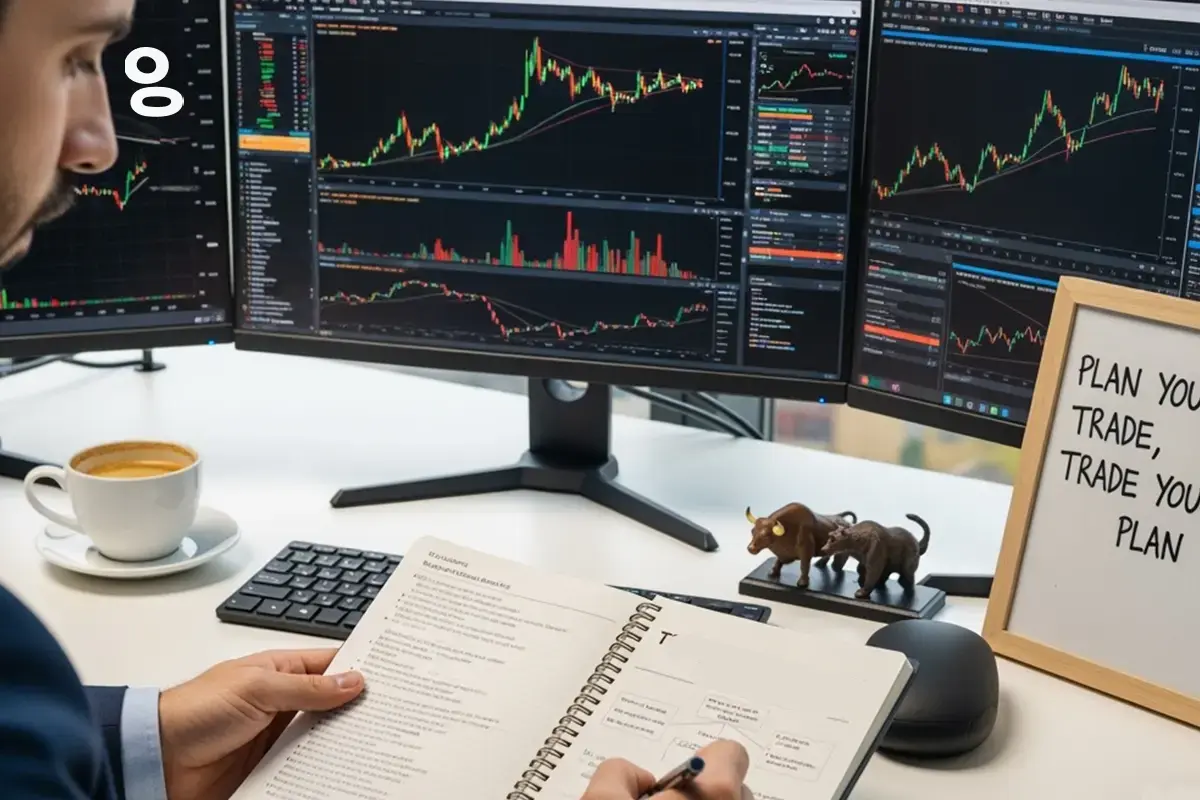Welcome to the final installment of our in-depth series on mastering trading psychology! In our previous articles, “Mastering Trading Psychology: Why Mindset Dictates Market Success” and “Mastering Trading Styles: Psychological Impact & Practical Application,” we established the vital role of mindset. We also explored common psychological challenges and the unique demands of different trading styles. Now, we bring it all together by focusing on actionable strategies for cultivating powerful trading psychology. This article provides practical techniques. It details how psychology impacts actual trade execution.
- How to Build Strong Trading Psychology
- How to practice psychology in trading?
- How do I fix my trading psychology?
- How to train psychology in trading?
- How to control the mind in trading?
- How do you study trading?
- Which strategy is best for trading?
- What is the 1% rule in trading?
- 1. Journaling Your Trades and Emotions
- 2. Create a Rules-Based System
- 3. Practice Mindfulness and Mental Clarity
- 4. Set Realistic Goals
- 5. Learn from Other Traders
- What is the best psychology book for trading?
- 6. Build a Supportive Network
- How Psychology Affects Trade Execution
- Conclusion: Think Like a Trader, Not a Gambler
How to Build Strong Trading Psychology
Developing a resilient mindset is not a quick fix; it takes time and effort. It takes considerable time and consistent effort. It requires conscious dedication, persistent practice, and a genuine willingness to reflect honestly on your actions. Here are some proven techniques to effectively strengthen your trading psychology. This journey demands deep self-awareness. It builds long-term mental fortitude.
How to practice psychology in trading?
You can develop your trading psychology by consistently journaling your trades and emotions, establishing a rules-based system, practicing mindfulness, setting realistic goals, learning from experienced traders, and building a supportive trading network. These habits reinforce discipline. They create mental fortitude. Consistent application is crucial.
How do I fix my trading psychology?
Fixing trading psychology involves recognizing emotional triggers, implementing strict risk management, adhering to a defined trading plan, practicing patience, seeking mentorship, and cultivating self-awareness through consistent journaling. It is a continuous self-improvement process. This proactive approach yields results. It demands persistent effort.
How to train psychology in trading?
Training psychology in trading involves deliberate practice of emotional regulation, developing strict discipline through a rules-based system, setting process-oriented goals, and continuous self-reflection to identify and correct behavioral patterns. It builds mental resilience over time. This systematic approach is practical. It fosters consistent improvements.
How to control the mind in trading?
Controlling your mind in trading involves practicing mindfulness techniques, detaching emotions from individual trades, focusing on disciplined execution of your plan, and regularly reviewing your mental state. This cultivates a calm, rational approach. It fosters mental clarity. This enables objective decision-making.
How do you study trading?
Studying trading effectively involves learning market fundamentals and technical analysis, but crucially, it also requires dedicated practice in managing one’s own emotions, biases, and psychological responses to market conditions. This holistic approach builds genuine proficiency. It encompasses both theory and self-mastery.
Which strategy is best for trading?
There is no single “best” strategy for trading; rather, the most effective approach is one that aligns with a trader’s psychological profile, risk tolerance, and time commitment, enabling consistent and disciplined execution. Mental fitness often dictates a strategy’s success. It ensures sustainable performance. Adaptability is key.
What is the 1% rule in trading?
The 1% rule in trading is a risk management guideline that suggests risking no more than 1% of your total trading capital on any single trade, significantly mitigating potential losses and thereby reducing emotional stress. This disciplined approach helps protect capital and foster psychological stability. It promotes calm decision-making. It limits emotional fallout.
1. Journaling Your Trades and Emotions
Keeping a detailed trading journal stands as one of the most powerful habits a trader can adopt. Do not just record your trade entries and exits; also, track your trade profits and losses. Importantly, document your emotional state during each trade. Note down specific details like:
- What were your thoughts before placing the trade?
- Did you feel confident or anxious at different points?
- How did you react to sudden price movements, both favorable and unfavorable?
Over time, your journal will reveal recurring patterns in your thinking and emotional responses. This deep self-awareness becomes the first step toward psychological mastery. It helps you identify specific weaknesses. Ultimately, it enables targeted improvement. This consistent reflection yields powerful insights.
2. Create a Rules-Based System
Relying on intuition or fleeting gut feelings can prove dangerous and inconsistent in trading. Instead, build a comprehensive, rules-based trading system. This system should explicitly define:
- Clear entry and exit conditions for every trade.
- A precise risk allocation per trade.
- Maximum limits for the number of trades per day or week.
- Specific profit-taking strategies.
Following a structured plan significantly helps reduce emotional decision-making. It keeps you focused solely on objective execution rather than being swayed by volatile market emotions. This systematic approach builds discipline. It fosters consistent behavior.
3. Practice Mindfulness and Mental Clarity
Mindfulness techniques offer powerful tools for mental preparation. Practices such as meditation, focused breathing exercises, or even a short, mindful walk can effectively calm the mind before trading. A clear and focused mind performs better under pressure and is less likely to make impulsive decisions.
Begin your trading day with a positive and grounded mindset. Ensure that you do not carry emotional baggage from your personal life or previous trades into the markets. Maintaining mental clarity allows for objective analysis and disciplined execution. It fosters optimal performance.
4. Set Realistic Goals
Avoid setting unrealistic financial targets. Instead of trying to make a fixed amount of money every single day, set process-oriented goals. Examples include:
- “I will follow my trading plan exactly today.”
- “I will manage my emotions and not engage in revenge trading.”
- “I will only take high-probability, A+ setups that meet my criteria.”
This fundamental shift in mindset helps alleviate pressure. It aligns your focus squarely on achieving consistency in your process rather than obsessing over daily monetary outcomes. Consistency, in turn, builds long-term profitability. This empowers sustainable growth.
5. Learn from Other Traders
Seek knowledge from those who have mastered the psychological game. Reading books, watching insightful interviews, or listening to podcasts featuring experienced traders provides invaluable insight. You learn how they effectively handle emotions, navigate losses, and manage mindset shifts. Learning from others’ experiences helps you build robust mental models and proactively avoid common, costly psychological mistakes in your trading journey. Books like “Trading in the Zone” by Mark Douglas or “The Psychology of Trading” by Brett Steenbarger are essential reads for developing a strong mental edge.
What is the best psychology book for trading?
“Trading in the Zone” by Mark Douglas is widely regarded as one of the best psychology books for traders, offering profound insights into developing a winning mindset and overcoming emotional pitfalls. “The Psychology of Trading” by Brett Steenbarger is another highly recommended resource. Both offer profound wisdom.
6. Build a Supportive Network
Trading can often feel like an isolating profession. Being part of a dedicated trading community, whether online forums or local groups, offers immense benefits. This network allows you to share experiences openly. You can discuss trading ideas and receive constructive feedback. Discussing trades with others can help reduce feelings of isolation and provide a crucial perspective when you find yourself stuck in emotional loops or facing difficult decisions. A supportive network reinforces discipline and encourages continuous learning.
How Psychology Affects Trade Execution
Let’s take a deeper look at how psychology subtly and overtly influences each step of the trade lifecycle. Understanding these influences is key to disciplined trading.
- Before the Trade: Anxiety might prevent you from entering a trade. This can happen even if all your established conditions are met, leading to missed opportunities. Fear often freezes optimal action.
- During the Trade: Fear might lead you to exit a profitable position too early, cutting potential gains short. Conversely, greed might keep you in a losing trade for too long, turning small losses into large ones. Emotional responses dictate holding periods.
- After the Trade: A winning trade might inflate your ego, leading to overconfidence in subsequent trades. A loss might trigger intense frustration, prompting you to engage in impulsive revenge trades to recover perceived losses. Post-trade emotions demand careful processing.
By being mindful of these critical moments, you can effectively train your brain to pause and respond rationally, rather than instinctively reacting emotionally. This deliberate practice builds resilience. It fosters objective decision-making.
Conclusion: Think Like a Trader, Not a Gambler
Ultimately, success in trading is not about always being right; it’s about being consistently disciplined. The market does not reward intelligence, technical skills, or sheer luck in isolation. Instead, it consistently rewards emotional discipline, adaptability, and unwavering psychological resilience.
If you truly aspire to achieve long-term success in trading, shift your focus. Concentrate less on chasing immediate profits and more on meticulously building and strengthening your mindset. Master your emotions, learn valuable lessons from every mistake, diligently journal your trades for self-reflection, and cultivate a robust long-term perspective. Remember, the most potent edge you can possess in the financial market isn’t a secret strategy or a magical indicator—it is inherently you. Your psychological strength is your most powerful asset. This self-mastery truly unlocks consistent profitability.







